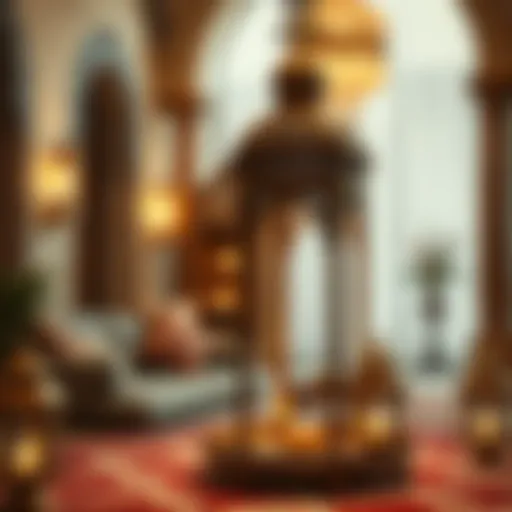Understanding Ramadan 2023 Timing in Dubai
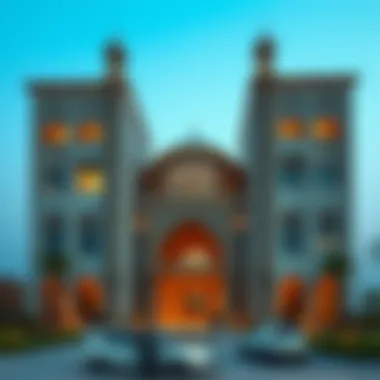

Intro
Ramadan, a month of fasting, prayer, and reflection for Muslims around the globe, holds a profound significance especially in the United Arab Emirates. In 2023, this holy month is expected to draw attention not only for its spiritual aspects but also for the practical implications it brings forth in Dubai, a city known for its vibrant lifestyle and economic activities.
As individuals and businesses gear up for Ramadan, understanding the timing and how it intertwines with daily life, prayer schedules, and cultural practices is essential. This guide offers a thorough insight into these aspects, aiming to equip residents and visitors with the knowledge needed to navigate through the month smoothly. From the pre-dawn meal of Suhoor to the evening Iftar gatherings, every moment in Ramadan sets the rhythm for community interactions and business operations alike.
Key dynamics, including prayer timings, will influence public services, local markets, and social engagements. Clarifying these elements can pave the way for better planning, ensuring that the holy month remains a source of peace and community spirit. By understanding the local customs and the timing involved, one can truly appreciate the essence of Ramadan in this bustling metropolis.
Overview of Ramadan
Ramadan is more than just a month of fasting; it’s a period packed with deep meaning and a chance for community bonding. As a pivotal event in the Islamic calendar, Ramadan draws attention to themes such as spiritual growth, empathy, and charity, creating a sense of unity among Muslims worldwide. This article embarks upon an exploration of how Ramadan unfolds in Dubai in 2023, underscoring the time-related aspects and cultural nuances that define this sacred month.
Meaning and Importance
During Ramadan, Muslims abstain from food and drink from dawn until sunset, reflecting on matters such as self-discipline, moral integrity, and compassion toward others. It's a time to pause, engage in prayer, and strengthen one’s connection to God.
Fasting serves not just as a physical challenge but also as an opportunity for personal reflection. Fasting during Ramadan promotes clarity of thought, which can lead to better decision-making in personal and professional life. It also enhances community belonging, as families and friends gather for meals, share experiences, and partake in collective prayers.
Additionally, Ramadan acts as a reminder to engage in charitable acts. Many choose to donate to those in need, emphasizing the significance of helping others as part of spiritual enhancement.
Historical Context
The roots of Ramadan trace back to the time of Prophet Muhammad, who began fasting and praying during this month after receiving the first revelations of the Quran. This historical milestone transforms Ramadan into a foundation for Islamic teachings. The Quran is considered the literary and spiritual guiding force for Muslims, so it sets a unique precedent for the month itself.
Moreover, the historical observance of Ramadan has evolved—different cultures around the world have integrated diverse customs and traditions into the core practices of fasting and prayer. In Dubai, local customs reflect a blend of traditional Islamic practices and modernity. Appreciating the historical context puts into perspective why Ramadan holds such significance in the hearts of millions and why understanding its timing has a considerable impact on daily life, community engagement, and overall societal rhythm.
"Ramadan is not merely a time of fasting; it is a time to grow, reflect, and engage with your community."
In summary, grasping the essence of Ramadan provides insight into the cultural and spiritual practices that frame this sacred period. The significance of timing in 2023, and how it interfaces with the local way of life in Dubai, deserves our attention as we delve deeper into the topics ahead.
Timing of Ramadan in
The timing of Ramadan holds considerable significance for Muslims around the world, and this year, the observance in Dubai is no exception. Understanding the timing is crucial not just for those observing the fast, but also for the broader community—including businesses and local institutions. Knowing when Ramadan starts and ends is vital for local culture and social practices, shaping the rhythm of everyday life.
Being aware of the timing helps residents and visitors alike navigate through altered schedules—whether it's for work, education, or social engagements. It’s during this month that many customs flourish, and connecting with the community takes root. This guide aims to articulate the timeline surrounding Ramadan 2023 and its implications for various stakeholders in Dubai.
Start and End Dates
In 2023, Ramadan is expected to begin on the evening of March 22nd and will likely conclude around April 21st. The exact dates might differ due to the lunar calendar. Thus, the sighting of the moon is pivotal here.
This variation from year to year makes it essential for individuals and organizations to check announcements from reliable local authorities, such as the Islamic Affairs and Charitable Activities Department in Dubai. Familiarity with these dates ensures that everyone, from believers to businesses, can plan accordingly and respect the customs associated with the holy month.
Importance of Start and End Dates:
- Cultural Significance: These dates herald a period of reflection, prayer, and communal activities.
- Business Adaptability: Companies often adjust their operating hours, particularly in Muslim-majority areas. Hence, knowing these dates helps businesses prepare for possible changes in consumer behavior.
- Social Interactions: Friends and family often plan Iftar gatherings or visit one another during this time, necessitating clear communication about food arrangements or scheduling.
Given that Ramadan comes with a unique vibe in Dubai, knowing when it begins and ends aids in the orchestration of social and cultural events that mark this significant period.
Eid Al-Fitr Timing
After a month of fasting, Eid Al-Fitr is the celebration that marks the end of Ramadan. In 2023, Eid is expected to commence on April 21st, with festivities likely continuing into the following day. As with the beginning of Ramadan, the confirmation of Eid relies on the sighting of the moon.
Eid Al-Fitr is often regarded as the "Fest of Breaking the Fast," and the day is filled with communal prayers, feasting, and giving to charity. It’s a time when friends and family come together, often exchanging gifts and sharing meals that highlight the communal spirit of the occasion.
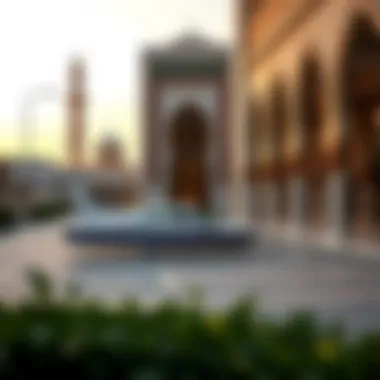

Key Highlights for Eid Al-Fitr:
- Prayer Times: The special prayers held on Eid morning are typically conducted shortly after dawn, necessitating early preparations among attendees.
- Community Celebrations: Events and gatherings often take place in public spaces, promoting camaraderie among all residents.
- Charitable Acts: Many locals incorporate acts of charity into the celebration, ensuring that those less fortunate also partake in the joy of Eid.
In essence, understanding the timing of both Ramadan and Eid Al-Fitr allows for better preparation and aligns spiritual observances with community practices, thereby enriching everyone’s experience during this holy month.
Prayer Schedules in Dubai
Understanding the prayer schedules in Dubai during Ramadan is crucial for Muslims and non-Muslims alike. This playing out of faith takes on a marked tone during the holy month, with specific routines that need to be adhered to. Fajr, Maghrib, and Taraweeh prayers hold particular significance, and this article aims to shed light on their scheduling and importance.
Fajr Prayer Timing
Fajr, the pre-dawn prayer, marks the beginning of the day's fast for Muslims. In general, this prayer is offered before the sun rises. In Dubai, the Fajr prayer time varies slightly each day during Ramadan, making it essential for residents to check a reliable Islamic calendar or local mosque schedules.
By observing Fajr timing, worshippers can properly start their fast, allowing them a chance to prepare spiritually for the day ahead. Devout Muslims often use the moments before Fajr to engage in personal supplication and reflection.
Knowing that the Fajr time usually falls between 4:30 AM and 5:00 AM depending on the day, it is vital for those observing Ramadan to set alarms and create a routine that accommodates this sacred timeframe.
Maghrib Prayer Timing
As night falls, families gather to break their fast with the Maghrib prayer, which occurs just after sunset. In Dubai, Maghrib timing typically begins around 6:45 PM to 7:00 PM throughout Ramadan.
This prayer holds a special ambiance, as it's a moment for gratitude and togetherness. Families and friends often break their fast in the presence of one another, sharing dates and water as per tradition. Observing this prayer not only strengthens one’s faith but also fosters community ties.
Moreover, it's quite common to hear the call to prayer being announced from local mosques throughout the city, serving as a reminder that it’s time for Maghrib. For those visiting Dubai, it offers a unique insight into local customs and the vibrant life pulsating through neighborhoods during Ramadan.
Taraweeh Prayer Practices
Taraweeh prayers are held after the Isha prayer during Ramadan and are significant for mosques and communities at large. These prayers are not obligatory, yet participating in them is seen as a commendable act. In Dubai, mosques come alive during the nights of Ramadan, hosting Taraweeh sessions that can take up to two hours, yet provide a sense of calm and communion among participants.
Importantly, the Taraweeh prayer schedule can vary from one mosque to another. Some may hold shorter prayers with fewer units (rak’ahs), whereas others might aim for the traditional twenty rak’ahs, making for a more extended experience. Many mosques even offer the option to perform this prayer in congregation, which helps create a sense of community.
For anyone observing Ramadan in Dubai, these prayer timings serve as a spiritual guide, emphasizing a balance between devotion, community, and reflection. Understanding and respecting these practices is essential for both Muslims and expatriates living in or visiting the city, as it weaves deeper connections within the fabric of Dubai's vibrant community during Ramadan.
Cultural Practices During Ramadan
During Ramadan, the holy month of fasting, cultural practices in Dubai take on a unique significance. They serve not only to enhance the spiritual experience of the faithful but also to strengthen community ties. These customs are deeply ingrained in the fabric of daily life and showcase the rich tapestry of traditions that make Dubai a truly remarkable place to observe this month.
Traditions and Customs
The traditions surrounding Ramadan are diverse and deeply rooted in Islamic principles. One of the core aspects is the practice of fasting from dawn until sunset, which encourages self-discipline and spiritual growth. Every evening, the call to prayer signifies the moment for iftar, the meal to break the fast. It’s customary for families and friends to gather, fostering a sense of unity and belonging.
Additionally, you may notice how homes and mosques are adorned with lanterns and decorative lights. These illuminations create a festive atmosphere that contrasts beautifully with the solemnity of fasting hours. It’s not just about individual practices; the sense of community plays a significant role. Families invite neighbors to join in their meals, and the act of sharing food amplifies the feelings of charity and love.
“During Ramadan, every act of kindness counts, and it’s a time when community spirits soar.”
Iftar and Suhoor Meals
Iftar, the meal that marks the end of the day’s fast, is an affair to remember in Dubai. Restaurants and hotels often offer lavish buffets. Popular dishes include dates, lentil soup, and an array of Middle Eastern specialties like hummus and kebabs. Traditional Emirati food, such as harees and majboos, also finds its way to the table.
On the flip side, there’s suhoor, the pre-dawn meal that keeps energy levels up throughout the day. Typical foods for suhoor include high-fiber items like oatmeal or whole grain breads, as they provide sustained energy. Families usually wake up early for this, and it’s not uncommon to hear laughter and chatter as people start their day. These mealtimes are much more than just nourishment; they embody family values and communal solidarity.
Community Events and Activities
Ramadan in Dubai is also characterized by numerous community events and activities that aim to promote spiritual reflection and social coherence. Local organizations and mosques often host charitable initiatives, where people contribute food and money to those in need. Community iftars are quite popular, providing meals for the less fortunate and helping build bridges between different cultural groups.
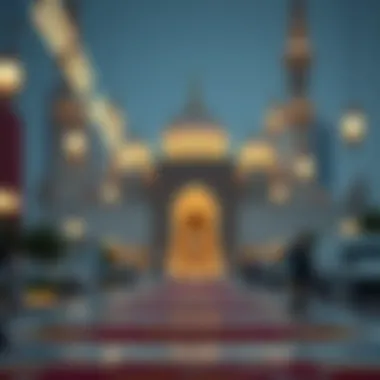

Cultural centers hold workshops, lectures, and storytelling sessions about the significance of Ramadan and the stories contained within the Quran. With the aim of fostering understanding and inclusivity, these events encourage participation from all walks of life, irrespective of their faith. They often feature naas (Arabic songs), poetry readings, and discussions about the ethical values derived from Islamic teachings.
In summary, the cultural practices during Ramadan are a testament to the values of charity, community, and reflection that define the holy month. They foster an atmosphere of togetherness that nurtures the spirit of the season, making it a vibrant period for both residents and visitors in Dubai.
Impact of Ramadan on Daily Life
Ramadan, a month of fasting and spiritual reflection, carries profound implications not just for individuals observing the fast, but for the entire community in Dubai. The practices during this time ripple across various aspects of daily life, affecting business operations, school schedules, and public transport systems, among other components. Understanding these impacts offers a clearer picture of how this holy month unfolds within the emirate’s vibrant atmosphere.
Business Operations
During Ramadan, business environments in Dubai often adapt to fit the unique pace of the month. Many companies adjust their working hours, typically starting later in the morning and ending earlier in the afternoon. This shift accommodates the fasting schedule, allowing employees to manage their energy better and partake in iftar with their families. Most shops and offices find a rhythm that caters to a different routine, with customers often waiting until after sunset to do their shopping or errands.
For instance, a thriving restaurant like Al Fanar sees significant changes. While in normal times, breakfast or lunch might draw the midday crowd, during Ramadan, the focus shifts to iftar meals which can attract larger groups breaking the fast together.
- Key Considerations for Businesses:
- Adjusted working hours can affect client meetings.
- Increased demand for food and beverages tailored for iftar.
- Overall slow pace at the workplace as employees often prioritize spiritual observance.
School Schedules
In schools, the academic calendar must also blend with Ramadan. Many educational institutions modify their schedules to help students and staff observe the fast. Classes often start earlier in the day, concluding by noon or early afternoon. This ensures that students, especially younger kids, are not stressed from long hours without food and drink.
Moreover, many schools organize special events for iftar, encouraging a sense of community. Parents often partake in these gatherings, creating a strong bond among families. Interestingly, the curriculum takes on a spiritual flavor too, with classes incorporating discussions about Ramadan's significance in Islamic culture. Schools may also take breaks for prayers, allowing students to fully engage with their spiritual practices without feeling rushed.
- Changes Noted During Ramadan:
- Earlier start times for school to accommodate fasting.
- Reduced hours aim to protect student energy levels.
- Additional spiritual activities introduced into the curriculum.
Public Transport Adjustments
Public transport in Dubai sees its own transformations during Ramadan. Dubai Metro and bus services often revise their schedules to facilitate the increased foot traffic to mosques and iftar events. The timing of service offerings is particularly geared to cater to peak hours around the breaking of the fast, ensuring that commuters have access to public transport when they need it most.
Moreover, it is common for transport fares to remain consistent, providing residents and visitors alike affordable means to navigate the city. This practice supports community spirit, enabling everyone to participate in Ramadan activities without financial stress.
- Transport Changes to Note:
- Extended operating hours after iftar.
- Additional buses and metro trains to accommodate increased passengers.
- Adjusted schedules to align with prayer times.
Ramadan presents a unique interplay between faith and daily life. Understanding these adjustments allows for a more enriching experience within the community.
In summary, the effects of Ramadan on daily existence in Dubai are substantial. Businesses shift their practices, schools reimagine their schedules, and public transport aligns with the spirit of the month. These adaptations not only help in facilitating the observance of fasting but also foster a communal atmosphere that embodies the essence of Ramadan itself.
Health Considerations During Fasting
Fasting during Ramadan is a spiritual journey, but it also poses unique challenges and considerations for physical health. Understanding how to properly navigate this month can enhance both religious fulfillment and personal well-being. Whether you are a seasoned observer or participating for the first time, paying attention to your health is essential for a successful fasting experience. This section will examine various health considerations that accompany fasting, outlining key elements including nutrition, hydration, and energy management.
Nutritional Advice
Maintaining a balanced diet during Ramadan is crucial. Your eating window is limited to the hours between iftar and suhoor. Here are some specific tips to keep in mind:
- Incorporate Whole Foods: Focus on whole grains, lean proteins, and plenty of fruits and vegetables. Foods like quinoa, lentils, chickpeas, and dark leafy greens provide necessary nutrients and keep you fuller longer.
- Avoid Processed Foods: Packaged snacks, sugary treats, and fried foods may be tempting but can cause energy crashes. Try replacing them with natural snacks like dates, nuts, or yogurt.
- Timing Matters: Instead of eating large meals, consider smaller, frequent meals. Breaking your fast with a few dates and water, followed by a balanced meal can be beneficial.
Making adjustments to one’s diet during this holy period enhances not only physical health but also mental focus during prayers.
Hydration Tips
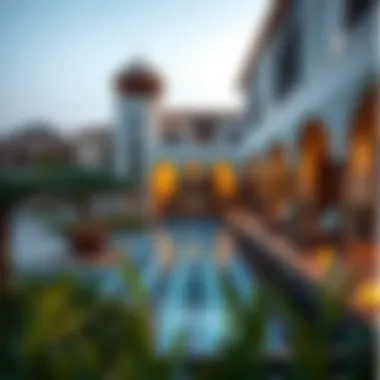

Hydration is crucial throughout the fasting period, especially given Dubai's hot climate. Here are strategies to help manage hydration:
- Drink Plenty of Water: Aim for at least eight glasses between iftar and suhoor. Avoid overly caffeinated drinks, as they can lead to dehydration.
- Incorporate Hydrating Foods: Foods like watermelon, cucumbers, and other fruits and veggies can contribute to your hydration levels.
- Set Reminders: It can be easy to forget to drink enough water. Set reminders to drink at regular intervals after iftar and before suhoor. Something simple like a phone alarm can help.
Remember that proper hydration leads to improved concentration and physical performance, both essential during prayer and other community engagements.
Managing Energy Levels
Managing your energy while fasting is a balancing act. It’s important to listen to your body and adjust activities accordingly. Here are a few pointers:
- Rest is Key: Get enough sleep at night, especially right after suhoor. Lack of sleep can lead to fatigue during the day.
- Be Mindful of Strenuous Activities: Try to schedule physical activities for after iftar when you can eat and hydrate. If you must exercise, opt for shorter, less intense workouts.
- Moderation in Everything: It can be tempting to indulge in rich foods after a day of fasting, but moderation is essential. Eating heavy meals can lead to sluggishness. Lighter meals, rich in nutrients, can help maintain your energy throughout the evening.
"Fasting is not just abstaining from food, but a way to cleanse both the body and the soul."
In summary, navigating health considerations during Ramadan calls for a mindful approach to diet, hydration, and overall well-being. By taking heed of nutritional advice, prioritizing hydration, and managing energy levels, you can enrich your fasting experience while still meeting the spiritual goals set by Ramadan.
Religious Observances and Community Engagement
During Ramadan, the essence of community and faith intertwines profoundly in Dubai. The religious observances celebrated during this holy month go beyond personal sacrifice and fasting; they are a pivotal aspect of collective identity and solidarity among Muslims. This section aims to delve into the meaningful practices and gatherings that define these observances, highlighting both their spiritual significance and their role in fostering community bonds.
Charitable Giving during Ramadan
Charity, also known as Zakat, holds a special place in the hearts of many during Ramadan. The act of giving is not just encouraged but emphasized as an essential duty for Muslims. The less fortunate are often provided with not only food but also financial assistance, intended to uplift those in need.
In Dubai, philanthropic activities ramp up significantly throughout this month, with various organizations and individuals engaging in community support. Many mosques organize food drives, distributing meals to the less fortunate at Iftar, the meal that breaks the daily fast. For instance, local groups might set up tents offering free meals on busy streets or near significant landmarks, ensuring that everyone has a chance to partake in the communal breaking of the fast.
Moreover, businesses often contribute by donating a portion of their profits to charitable causes. This collective effort resonates with the spirit of Ramadan, where generosity and compassion are at the forefront.
"The act of giving during Ramadan transforms not just the giver but also the community. It creates tangible bonds of care and responsibility."
Community Prayer Gatherings
Another central pillar of Ramadan is the communal prayer gatherings held in the evenings. Following the Taraweeh prayers, many mosques in Dubai become hubs of support and engagement. These gatherings are not only about worship, but they also serve as important social occasions where re-connecting with friends, family, and neighbors becomes a joyful reality.
Typically, mosques witness a surge of attendees during this period, with worshippers filling every corner, from the main prayer hall to the outer courtyards. This scene reflects the profound unity and shared faith, unveiling the vibrant spirit of the community.
Additionally, communal prayers can sometimes evolve into platforms for discussions on community issues or collective goals, making them fruitful occasions for building social capital. It’s common to see groups organizing events such as educational talks and workshops within the mosque premises, proving that spiritual gatherings also blossom into avenues for knowledge sharing.
The atmosphere during these prayers is notably different, marked by a sense of peace and togetherness. Participants often leave with a reinforced sense of belonging, anchoring ties that bind the community.
In essence, the religious observances and community engagement during Ramadan in Dubai reflect an integral part of the local culture. They manifest not only spiritual devotion but also a concerted effort toward collective welfare and solidarity among Muslims.
Epilogue
The conclusion of this article is not merely an ending but a significant reflection on the rich tapestry that Ramadan weaves into the lives of individuals and communities in Dubai. This holy month is deeply rooted in the spiritual and cultural landscape of the region, impacting almost every facet of daily life. Understanding its timing, observances, and community interactions during Ramadan is paramount for anyone—be it residents or visitors—involved in the economic and social fabric of Dubai.
Reflecting on Ramadan's Significance
Ramadan is more than just a time for fasting; it’s a period that embodies self-discipline, community bonding, and spiritual growth. The significance can be further examined through various lenses:
- Spiritual Wellness: For many, this month symbolizes a chance to rejuvenate faith and engage in practices such as increased prayer and reading of the Quran. It's a time where personal reflection and connection to the divine are placed at the forefront.
- Cultural Understanding: Observing how different cultures celebrate Ramadan within Dubai fosters appreciation and understanding among its diverse residents. It highlights the harmony in diversity—where Emiratis and expatriates partake in rituals like Iftar that turn mealtime into community gatherings.
- Economic Impact: Ramadan influences market activity, with increased demand for food and retail services before the meal times. This prompts local businesses to revamp their offerings to cater to the unique needs of consumers.
- Charitable Actions: It’s customary for individuals to engage in charitable donations, prompting a spirit of giving. Understanding the significance of Zakat during this period encourages investors and business owners to align their corporate social responsibility initiatives more closely with community needs.
Looking Ahead to Future Observances
As we reflect on this year’s Ramadan, looking to the future brings its own set of considerations:
- Trends in Observance: With changes in demographics and lifestyle, the observance of Ramadan may adapt over the years. For instance, newer expatriate communities may desire a blend of traditional practices with modern influences, changing how Iftar might be celebrated.
- Virtual Engagements: In recent years, digital platforms have provided opportunities for community engagement despite physical distancing. Future observances may further incorporate technology to facilitate prayer sessions and community events, reaching broader audiences.
- Sustainability Practices: There is a growing awareness around sustainability during Iftar and Suhoor, encouraging the use of local and organic food options. Awareness and practices that reduce waste during these meals may become more prevalent, appealing not only to the spiritual aspects but also to communal responsibility.
"Understanding Ramadan is a journey of cultural exploration and spiritual deepening that transcends individual practices."
In summary, Ramadan offers a time for reflection, community engagement, and spiritual growth within the unique context of Dubai. The insights gathered from this holy month extend beyond mere observance; they inform future interactions and practices within both social and economic realms, making it essential for everyone engaged in the dynamic atmosphere of Dubai.



